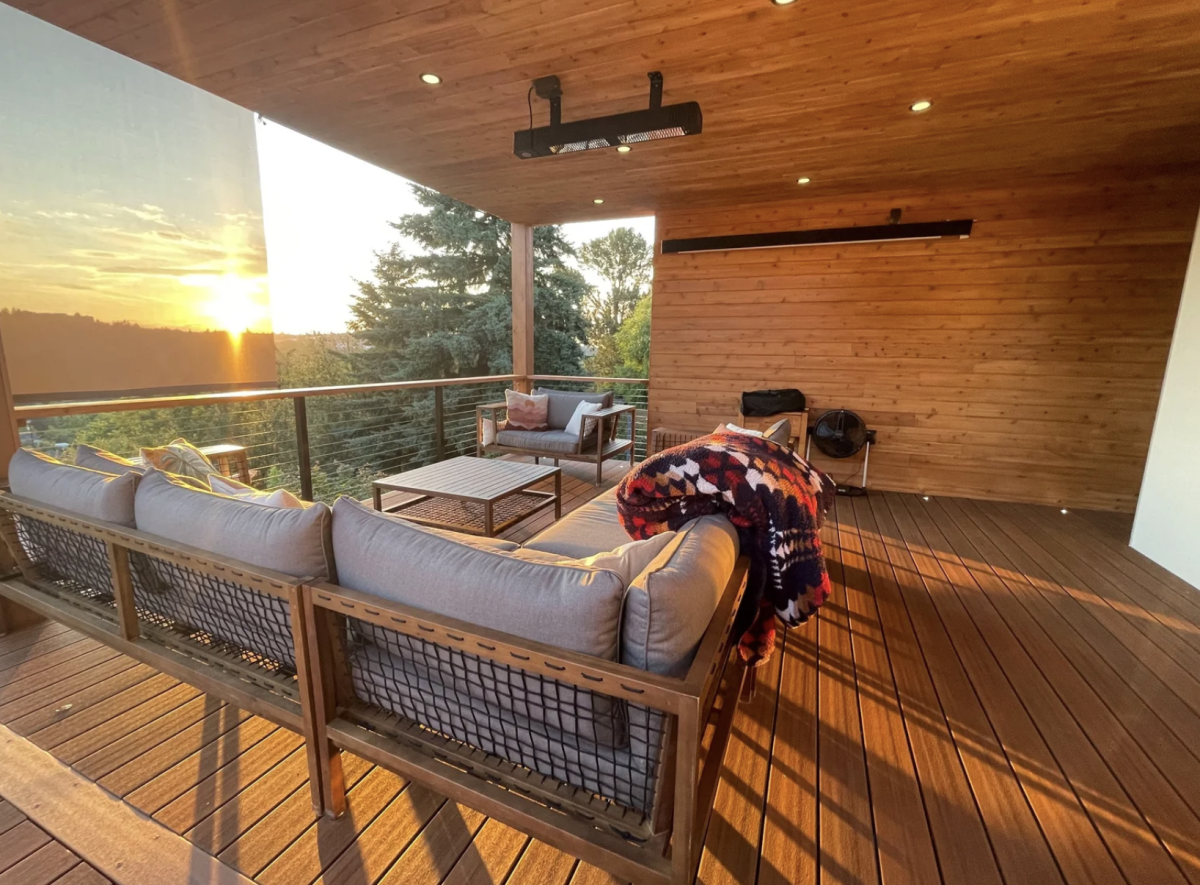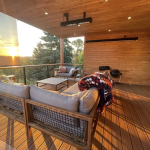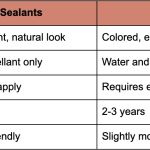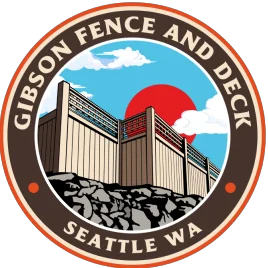Waterproofing a Deck
To waterproof a deck, apply a high-quality sealant or stain after proper preparation, or hire a professional deck contractor to build a fully waterproof deck designed to withstand the elements.
For those in the area, Seattle Deck Contractor, Gibson Fence and Deck, is your premier choice for decks that are as beautiful as they are durable.
Benefits of Waterproof Decking:
-
Prevents wood rot: Sealing blocks moisture from penetrating the surface, reducing decay.
-
Protects against mold and mildew: Minimizes the conditions that promote fungal growth.
-
Extends lifespan: Regular waterproofing saves money by reducing the need for replacements or repairs.
-
Improves safety: A dry, non-slippery deck is safer for daily use.
-
Enhances aesthetics: Keeps the deck looking fresh and vibrant even after years of use.
Assessing Your Deck's Current Condition
It's essential to evaluate your deck’s condition before waterproofing. Knowing what repairs or preparations are necessary will ensure the process goes smoothly and lasts longer.
Inspecting for Damage and Decay
Start with a visual check for obvious signs of wear and tear. Focus on areas prone to collecting water, like joints and edges. Pay attention to discoloration, warping, or soft spots, as these could indicate water damage.
Key Inspection Points:
-
Look for discoloration: Dark spots may signal water damage or mold.
-
Check for soft wood: Use a screwdriver to gently test if the wood is soft or crumbling.
-
Inspect fasteners and joints: Corrosion around screws and nails can weaken the structure.
-
Evaluate the surface finish: Worn or peeling finishes make the deck vulnerable to water.
-
Examine under the deck: Hidden damage often begins in areas shielded from view.
Testing Water Absorption Levels
Testing how your deck absorbs water is a simple yet effective way to gauge its current water resistance state.
A quick "water drop test" can reveal if the surface needs resealing.
Sprinkle a few drops of water on different areas of the deck. If the water beads up, the waterproofing is intact. If it soaks in quickly, the surface is unprotected and ready for resealing.
Regular testing can help you maintain your deck’s integrity year-round, especially after periods of heavy rain.
Selecting the Appropriate Waterproofing Method
Sealants and Stains
Sealants and stains are among the most common waterproofing options.
Sealants create a clear barrier that repels water, making them ideal for maintaining the wood’s natural appearance. Stains, on the other hand, penetrate the wood while adding color and UV protection. Both are affordable and relatively easy to apply but require reapplication every couple of years to remain effective.
Comparison of Sealants and Stains:
Under-Deck Drainage Systems
Under-deck drainage systems protect the deck structure and keep the area below dry.
These systems are installed beneath the deck boards with panels or membranes that direct water to gutters or collection areas.
They are more expensive upfront but offer long-term durability and are ideal for rainy climates or when using the space below the deck.
Waterproof Decking Materials
Waterproof decking materials resist water naturally and require little maintenance. Options include composite decking, PVC, and capped composite boards.
-
Composite decking: Combines wood fibers and plastic for rot resistance.
-
PVC decking: Fully synthetic and impervious to water.
-
Capped composite boards: Adds a protective layer for extra durability.
Step-by-Step Guide to Waterproofing Your Deck
Cleaning and Preparing the Surface
Remove all furniture, decorations, and debris from the deck.
Clean thoroughly with a stiff brush or power washer to remove dirt, mildew, and stains. Use moderate pressure to avoid damaging the wood.
Inspect for loose boards or protruding nails and fix them.
Sand rough spots to create a smooth surface for proper adhesion of the waterproofing product.
Applying the Waterproofing Product
Choose the Right Product: Select a sealant, stain, or waterproofing paint suited to your deck and climate. Opt for products designed for wet conditions like Seattle’s rainy weather.
Sealant Application: Apply evenly using a brush, roller, or sprayer. Work in small sections to avoid overlap. Apply a second coat if needed for extra protection.
Stain and Paint Application: Test stains on a small area first. Apply stains with long strokes along the wood grain. For waterproof paint, use thin, even layers to prevent peeling.
Drying and Curing Times
Allow waterproofing products to dry completely for 24-48 hours before using the deck.
Weather impacts drying, so plan the project during a dry period to avoid delays.
Maintenance Tips for a Long-Lasting Waterproof Deck
Regular maintenance keeps your deck looking great and extends its lifespan.
Start by keeping the surface clean and debris-free, especially after heavy rain or wind. Inspect the waterproofing every six months to spot any wear.
Maintenance Best Practices:
-
Sweep regularly: Prevent dirt buildup and avoid scratching the surface.
-
Clean with a gentle cleaner: Use a mild soap or deck-specific cleaner to remove stains without damaging the finish.
-
Reapply waterproofing as needed: Reapply every 1-3 years based on product recommendations.
-
Inspect for damage: Address cracks, warping, or peeling finishes promptly.
-
Avoid harsh chemicals: Stick to gentle products to preserve the waterproof layer.
Gibson Fence and Deck: Enjoy a Waterproof Deck in Seattle's Climate
Those living in Seattle understand the benefits of weather-resistant materials and construction. Waterproofing a deck gives the combined benefit of increased durability and a protected area under the deck.
If you are interested in working with an experienced Seattle deck contractor with an impressive portfolio and a long list of 5-star reviews, Gibson Fence and Deck is waiting for your call.
We build high-quality decks in all shapes and sizes. Multi-level or patio style, any waterproof deck from Gibson F&D will endure the elements with grace while keeping the area under it dry and inviting. Call today!




